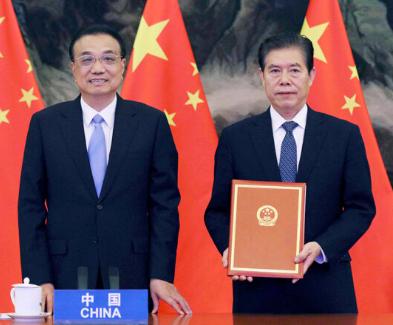BEIJING, Jan. 1 (Xinhua) -- The Regional Comprehensive Economic Partnership (RCEP), the largest international free trade agreement, entered into force on the 1st of January 2022. It is expected to give momentum to multilateralism and free trade amid the COVID-19 pandemic and the global economic recovery.
After its entry into force, more than 90 per cent of trade volume between countries that have ratified the agreement, will eventually be subject to zero customs duties.
The agreement was signed on 15 November, 2020 by 15 Asia-Pacific nations, including 10 countries of the Association of Southeast Asian Nations /ASEAN/, as well as China, Japan, the Republic of Korea, Australia and New Zealand, which was a result of eight years of negotiations that had been launched in 2012.
The original agreement entered into force in 10 countries that submitted ratification instruments to the ASEAN Secretariat.
The aggregate indexes of population, GDP and trade volume of the 15 parties to the agreement account for about 30 percent of the global figures. This new free trade bloc is expected to promote trade and investment in the Asia-Pacific region and to serve a boost for economic globalization.
Thanks to improved trade regulations, simplified procedures, and greater openness in the service trade and investment sectors, RCEP will bring tangible benefits to the member countries.
China will fully implement its commitments under the RCEP Agreement, and guide local governments, industries and enterprises to better use of the opportunities to be generated thanks to market openness, the Chinese Ministry of Commerce said.
According to the ministry, China will also be actively working with other member countries to turn the RCEP mechanism into one of the major platforms for trade and economic cooperation in East Asia.
The RCEP agreement made it possible for China and Japan to establish a direct free trade partnership, resulting in 86 percent of tariffs for Japanese products and 88 percent of Chinese products eventually dropped to zero.
"The RCEP agreement was signed at a very difficult time when the world was facing the COVID-19 pandemic challenges, experiencing anti-globalization sentiments. One can assume that it will serve as a driver and play a key role in promoting a new cycle of economic globalization through promoting free trade," said Wei Jianguo, senior expert at the Beijing-based China Center for International Economic Exchanges.
According to him, the agreement will significantly reduce the cost of regional trade, increase the products competitiveness, offer more business opportunities for enterprises, and provide more options and benefits for consumers.
The RCEP agreement will make a huge contribution to the economic recovery of the Asia-Pacific region and the world during the post-pandemic era, according to a study conducted by the Asian Development Bank.
It is expected that by 2030 the revenues of the agreement signatories will increase annually by 0.6 percent. and 2.8 million new jobs will be created in the member countries.
Source: russian.news.cn
Image source: profile.ru
Write to us
Write to us
- 5 Sovetskaya str., Block A, Novosibirsk, Russia
-
